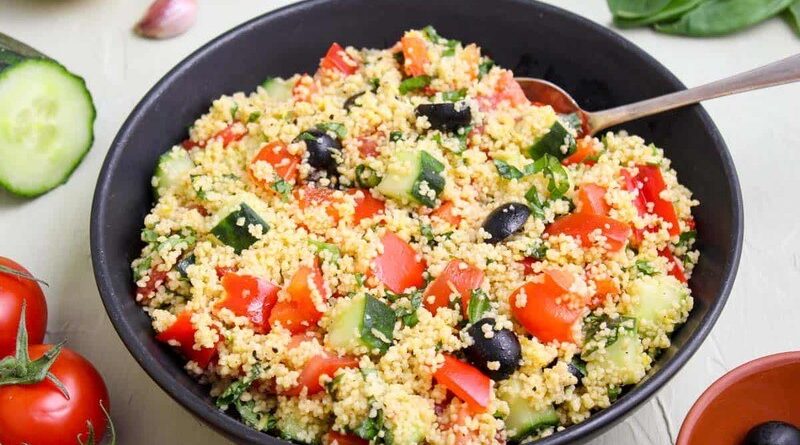Is Couscous Healthy? Exploring its Nutritional and Versatility
Due to its distinct flavor and versatility, couscous, a mainstay of North African cuisine, has become more popular across the globe. With more individuals concentrating on eating well, the topic of whether comes up, Is couscous healthy? In this piece, we examine the nutritional makeup of couscous, investigate any possible health advantages, and discuss how it fits into a balanced diet.
Knowing the truth about couscous is crucial whether your goal is to control your weight, strengthen your heart, or just make better eating decisions. Come along as we unearth the truth about this ancient grain and how it affects general health.
Nutritional Profile of Couscous
The nutritional profile of couscous is well-balanced, mostly consisting of carbohydrates, moderate protein, and low fat. About 36 grams of carbs, 6 grams of protein, and less than 1 gram of fat are found in a cup of cooked couscous. Furthermore, couscous has trace levels of important minerals and vitamins, such as iron, magnesium, selenium, and B vitamins.
Couscous adds to the total amount of dietary fiber consumed. Which supports digestive health, even if its fiber level may not be as high as that of some whole grains.
Health Benefits of Couscous
Couscous offers several health benefits:
Nutrient-Rich:
Essential components found in couscous, including as protein, carbs, vitamins, and minerals, promote general health and wellbeing.
Heart Health:
Couscous, which is low in cholesterol and saturated fat, helps to maintain cardiovascular health and lower blood cholesterol.
Digestive Health:
Couscous’s high fiber content helps maintain healthy gut bacteria and regular bowel motions.
Blood Sugar Control:
Couscous is a good option for people with diabetes or those trying to control their blood sugar since it has a moderate glycemic index, which helps to regulate blood sugar levels.
Weight Management:
The mix of fiber, protein, and carbohydrates in couscous helps regulate hunger and encourages satiety, which supports attempts to manage weight.
Couscous in a Balanced Diet
Because of its adaptability and nutritional value, couscous is a useful part of a balanced diet. Couscous is a great way to include a variety of textures and flavors into your meals while still getting your fill of vital nutrients including protein, carbs, vitamins, and minerals. People may make filling and nutritious meals that promote general health and well-being by balancing couscous with other food groups including vegetables, lean proteins, and healthy fats.
Couscous Impact on Blood Sugar Levels
Although couscous is a healthful food, its high carbohydrate content might affect blood sugar levels. It usually has a medium to high glycemic index, which means that blood sugar levels may rise to a moderate degree. Couscous has a high glycemic index, therefore people with diabetes or those trying to control their blood sugar should balance their intake of it with foods high in protein, healthy fats, and fiber.
Better blood sugar regulation can also be supported by adopting whole-grain alternatives and practicing portion control. Creating customized meal plans that take couscous consumption and general dietary requirements into account might be facilitated by collaborating with a healthcare professional or nutritionist.
Couscous in Weight Management
For several reasons, couscous can be an advantageous ally in weight management.
Low in Calories:
Couscous provides a tasty lunch alternative without a lot of calories—a cup portion has only 176 calories.
Complex Carbohydrates:
Its complex carbs slow down digestion, increasing feelings of fullness and decreasing the chance of overindulging.
Satiety Promotion:
Couscous, with its combination of fiber, protein, and carbohydrates, encourages fullness and reduces the desire for frequent snacking.
Versatile Meal Base:
Because of its adaptability, couscous may be used to create tasty, filling meals when combined with veggies, lean proteins, and healthy fats.
Portion Control:
Meals that are well-rounded and enjoyable without being overly caloric can be achieved by controlling portion sizes and combining couscous with other foods high in nutrients.
Physical Activity:
Including couscous in a well-balanced diet and engaging in regular exercise helps maintain a healthy weight and general well-being.
Potential Downsides and Considerations
Although couscous has several nutritional advantages, it’s important to weigh the pros and negatives before adding it to a diet to be sure it supports personal health objectives.
Gluten Sensitivity:
Because couscous includes gluten, people who have celiac disease or gluten intolerance should avoid eating it. For those who are sensitive to gluten, rice or quinoa are good gluten-free grain options.
Refined vs. Whole Grain Varieties:
The fiber and nutritional value of whole grain couscous are absent from refined couscous. Selecting whole grain varieties guarantees improved blood sugar regulation and the greatest amount of nutritional advantages.
Portion Control:
Because couscous can be high in calories, it’s important to restrict portion sizes, especially while trying to lose weight. It’s crucial to watch portion sizes and combine couscous with other nutrient-dense foods.
Added Ingredients:
Prepackaged couscous mixes could have flavorings, preservatives, or salt added to them. For greater control over the nutritional value, go for plain couscous and toss in your ingredients.
Balancing with Other Foods:
Even though couscous is a nutritious grain, a well-rounded diet should balance it with other food categories. Creating balanced meals using couscous requires combining it with lean proteins, vegetables, and healthy fats.
Conclusion
A versatile and nutrient-dense staple of North African cuisine, couscous has become more popular around the world. Rich in protein, carbs, vitamins, and minerals, its nutritional profile is well-balanced and supports heart health, digestion, blood sugar regulation, and weight control, among other health benefits.
To get the most nutritional value, people should choose whole grain products, watch what they eat, and take into account any dietary limitations or allergies. Couscous has a diverse culinary appeal and can be a healthy and nutritious addition to a balanced diet when consumed in moderation with other nutrient-dense foods.
You Can Read More About Healthy Things
Is Shrimp Healthy? Exploring Benefits, Risks & Amazing Tips
Is Rice Healthy? Unveiling the Truth & Wise Choices
